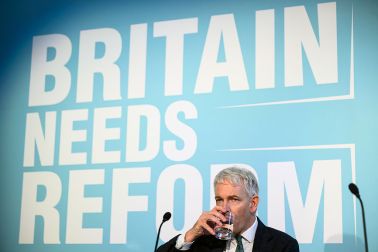When David Cameron unveiled his plans for a ‘Big Society’, transferring power from ‘the elite in Whitehall to the man and woman on the street’, Ed Miliband accused him of wanting to drag the welfare state back to Victorian times. Presumably he feared a Tory Britain in which a latter-day David Copperfield was left to be thrashed by Mr Murdstone. Actually, though, the idea of the Big Society has other precedents, many of them literary, with different implications. We find it in Samuel Johnson’s journalism.
‘The Benefits of Human Society’, an article written for The Rambler, balances scepticism with an uplifting idealism. Johnson, ‘by poverty deprest’ during his early years and reliant on the generosity of patrons for most of his life, knew very well that society could be a harsh place. In his poem, ‘London’, ‘malice, rapine, accident conspire’. It is partly, of course, a political injustice that this is allowed to happen, but it is also because people seem to make no effort to help one another. He argues that that we can feel a greater sense of self-worth through helping others – in his conception of the big society ‘no man…has need to suffer the mortification of seeing himself useless or burdensome to the community’.
As a professional man of letters, Johnson knew, too, that he had to please his readers in order to survive. ‘No man but a blockhead’, he once said, ‘ever wrote, except for money’. For him, esoteric literary experimentation was simply not an option. Rasselas is not exactly a great novel, but nor does it aspire to be – Johnson needed to pay for his mother’s funeral and settle the debts she had left behind, so wrote it in a week.
George Eliot’s depiction of Victorian life is underpinned by the idea of a big society. Middlemarch is a novel about people whose lots are ‘woven and interwoven’. Even if we are relatively independent, we cannot afford to ignore those around us. Fred Vincy assumes that he will be able to live as he pleases when Mr Featherstone dies and leaves his money to him. But, in the event, he is left nothing, so instead finds himself work and makes a contribution to the community. In Daniel Deronda, Gwendolen Harleth always blames her misfortunes on other people, in much the same way that we might be inclined to attribute some of our misfortunes to the failings of the state. But it is only when she’s prepared to take responsibility for her actions – and, thus, to recognise the effects of her behaviour on the people around her – that she can feel content.
This does not mean that Eliot and Johnson would have favoured an indifferent welfare state – a student loan would have allowed Johnson to complete his degree at Oxford, and a more enlightened education system would have allowed Eliot to go to university. But there is still something we can learn from their arguments – preachy though they may sometimes sound – for the Big Society where people are willing ‘to receive and communicate assistance’. For, according to Johnson, this is what ‘constitutes the happiness of human life’.





Comments